A Manager's Guide To Instilling Passion In The Workplace
Phil was an exceptional manager.
He knew having great talent was crucial, so he cherry-picked every employee on the team he managed. He knew employees performed best when the right compensation, tools, and resources were readily available.
Phil left no stone unturned in those areas, too.
He mediated with executives at all times, providing everyone on his team with all they needed to perform their best work.
Despite these efforts, most employees still didn’t bring their A-game.
Are you a manager who goes the extra mile for your team like Phil? I bet you’re wondering: Why are employees still lackadaisical at work even after giving them everything they need?
Well, the issue starts with this famous quote:
You can force horses to the stream, but you can’t force them to drink.
Likewise, you can give employees all they need. You may even promise extra rewards if they hit new milestones. Heck, you can even increase their salaries.
All these are good.
But fail to instill passion in the workplace you manage, and your efforts will fall flat. Since you’re still reading, I’m sure you can relate, as this is a massive problem across America.
Deloitte’s study revealed this.
In their research, over 87.7% of the workforce across American companies lack passionate employees. That leaves us with only 12.3 percent of employees with attributes of worker passion.
Passion is an intangible trait, no doubt.
But that doesn’t mean you can’t instill it in the employees you manage, and by extension, your workplace. In short, this article outlines four ways to do it.
Table of Contents:
Before we dive in…
As I said earlier, employees’ passion is an intangible trait.
It’s not something you can measure or improve with blind quantitative data. You’re most likely to sense it when they speak out. Leslie Perlow observed this in a study reported on the Harvard Business Review.
When employees feel unable to speak out, negative emotions like resentment and anger bubble up, which can ‘shut down creativity’ and chip away at motivation, productivity, and performance.
Leslie’s report calls you not to be like manager Phil, our fictional character. Here’s why.
Phil focused only on recruiting top talent and providing them all he thought they needed. Doing those things may drag employees to the stream. It won’t get them to drink.
Your best shot?
In addition to providing the tools and resources they need, ask the employees you manage how they feel from time to time.
In other words, give them a voice to speak out.
For instance, say you wanted to know how the employees you manage feel about ideas they share with you. You can easily ask them via team anonymous team pulse surveys sent directly to their inboxes like this one:
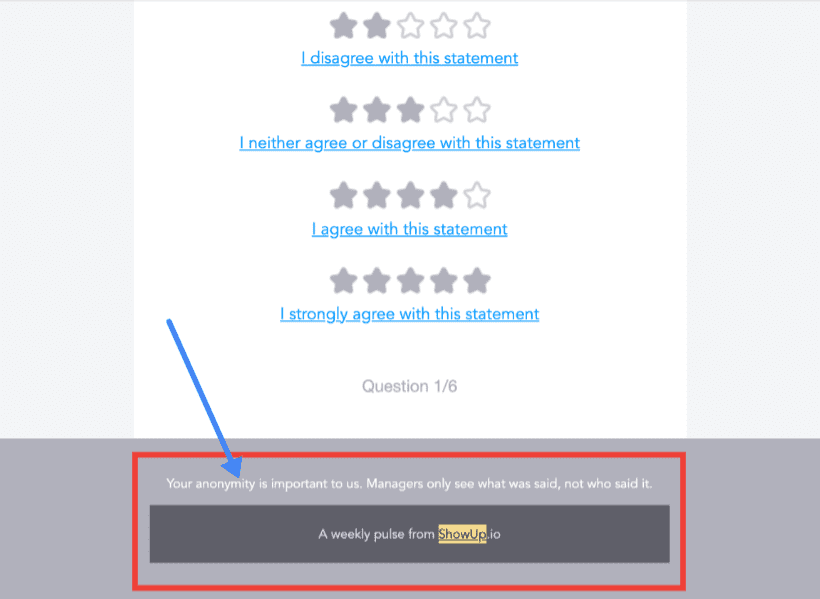
Take ShowUp for a Spin
Get real-time qualitative insights needed to instill passion in your workplace.
What Is Workplace Passion & Who’s a Passionate Worker?
Pleasure in the job puts perfection in the work- Aristotle
Aristotle’s quote shows passionate workers and workplace passion go hand-in-hand. And this makes sense.
To illustrate, take you, a manager reading this article, for instance.
My guess is you’re determined to instill passion in the workplace for you and the employees you manage. You know doing this will improve engagement, productivity and drive business outcomes.
So here you are; you wear many hats as a manager. Yet, you’re still taking the time, learning how to activate passion, right?
Good.
Now, imagine if all your employees took similar self-starting initiatives to get things done. Imagine if they found working under you so pleasurable they’ll go out of their way to do more than cross off tasks assigned to them.
What kind of work environment will you have with that?
You’ll have one with employees who aren’t just excited about coming to work but are willing to go the extra mile to get things done. Such employees always bring enthusiastic vibes and a can-do attitude.
They are what I call passionate workers.
And that’s because these employees aren’t scared to suffer for the job they do, no matter what. They bring so much positive energy and passion to the environment they work in.
When you have such positive energy from most employees you manage, you get team-wide workplace passion.
Why Passion Is Important In the Workplace
To understand the importance of passion in the workplace, managers must stop confusing it with job satisfaction.
A study by Integro tells you why.
As per the research, 78% of employees enjoy their work and get job satisfaction when their work makes a difference. However, only 44% of this same number are passionate about their employers (and managers).
Closing this significant gap – the passion deficit – is crucial to business growth.
It underlines the hidden emotional disconnects among employees who appear engaged from a distance. Chitra Reddy did an excellent job highlighting 15 reasons why in this piece.
Here, I’ll briefly touch on why it’s vital to managers.
It increases employee engagement
According to Deloitte’s study, American companies spent over $1 billion on employee engagement in 2017 alone.
We’re in 2021, so you can rightly assume that number is way higher now. But what do these companies have to show from such massive expenses?
Not much.
The same research found despite the billions of dollars spent to boost engagement, only 34% of employees were actually engaged.
You don’t need to overthink the cause of this.
Often, engagement among employees comes as one-time bumps. Employees can go from happy to unhappy to happy. They can be engaged at work today yet fake sick days the next.
In other words, workers who are only engaged don’t always seek higher performance levels that benefit themselves and you, their manager.
Passionate workers, on the other hand, will.
In short, if you focus on instilling passion in the employees you manage, you’ll get what Deloitte calls “Explorers."
Explorers are so passionate they go beyond engagement to seek new challenges. They’re more committed and connect with teammates to make a significant impact always.
Passion transforms employees into company ambassadors
Passion, or whatever you like to call it, is like an inside fire that drives people down their career paths. Yes, it’s intangible.
But it’s real and not something anyone can fake for long.
Ultimately, passionate employees become brand ambassadors for the company. And it’s something all managers seeking continual progress and team alignment should desire.
Why?
Because once you achieve workplace passion, employees become purpose- and customer-obsessed. This means they’ll go out of their ways for you, their manager, and the company at large.
According to McKinsey, that’s a must-have. As per their report:
Passionate employees radiate enthusiasm to customers and communities alike. Your [employees] can also be your best barometers of progress.
Imogen Hitchcock is an experienced Communications Expert. She agrees on the intersection between passion and ambassadorship.
In a podcast by Happeo, Imogen advised how managers can build passionate employees who become brand ambassadors.
I think that unless your employee base understands where the company is going, what their role is in that, and how they fit into the bigger picture, then actually your company is not going to succeed.
In summary, employees want to know how they fit into your team’s (and company’s) big picture. Satisfy this need, and you’ll build passionate employees who go on to become brand ambassadors.
The good news is you can do this with employee pulse surveys.
How Team Pulse Surveys Builds More Passionate Employees
Let me bring your attention to a real issue.
By 2030, Korn Ferry’s study estimates there’ll be a worldwide human talent shortage of over 85 million people.
So in today’s scarce talent climate, don’t expect talented employees to transform into passionate workers by chance. You must set the stage for them to become emotionally connected and passionate about the work you need them to do.
And it starts by throwing assumptions to the side.
As a manager, make it a duty to ask your employees how they feel always.
For instance, most managers think they’re polite. Employees, on the other hand, feel otherwise. And this leads to an emotional disconnect from work.
But with team pulse surveys sent out weekly or bi-weekly, you can automate asking such complex questions.
What’s more?
A tool like ShowUp anonymizes the answers, so employees feel safe to provide you accurate responses without biases:
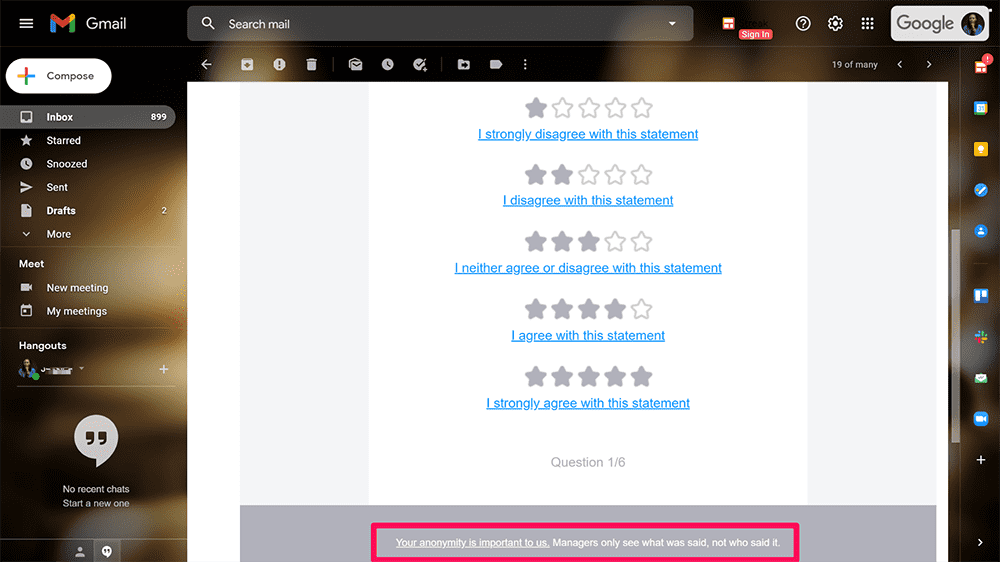
ShowUp also collates these responses from all employees in real-time.
It crunches the data, leaving you with quantitative and qualitative insights for instilling passion in your workplace:
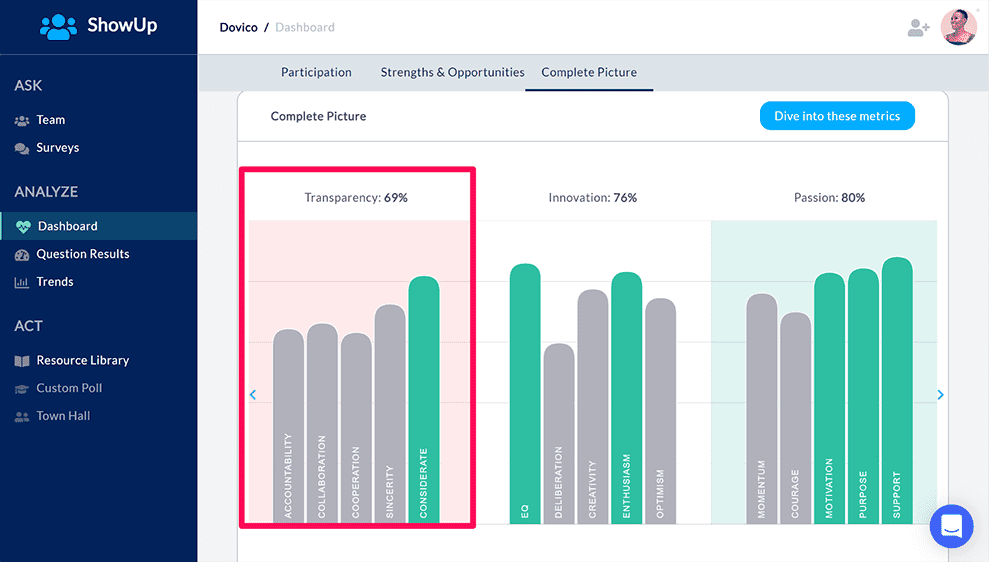
Automate Surveys & Sense How Employees Feel
Get real-time qualitative insights needed to instill passion in your workplace.
Four Ways Managers Can Improve Workplace Passion
If you increase passion for work, you’ll also improve employee engagement.
Deloitte’s study confirmed this.
Their research found 64% of all workers who aren’t passionate were not also engaged at work. So by improving passion, you also end up boosting passion.
Here are four ways managers can go about it.
Hire for purpose alignment
Poor hires are expensive.
First, they’ll cost you and your company time and money.
According to CareerBuilder, 74% of organizations that hire poorly lose an average of about $14,900. This one is a topic for another post.
Besides these costs, poor hires also bring negative energy to the workplace. And by extension, make it almost impossible to achieve workplace passion.
To avoid this, hire well.
Hire people who align with your company’s purpose. To do this, start by filtering people passionate about your company and the role.
Here’s a good way to proceed. Peter Capelli’s report for HBR recommends removing people who end up being unhappy working with you.
More than a generation ago, the psychologist John Wanous proposed giving applicants a realistic preview of what the job is like. That still makes sense as a way to head off those who would end up being unhappy [and not passionate] in the job.
Make Employees Feel Respected
Respect, they say, is reciprocal.
And when it comes to workplace passion, this is true.
Writing for the Harvard Business Review, Kristie Rogers said:
Because people’s jobs are often central to who they are and how they perceive themselves, respectful cues in a professional setting are important signals of social worth.
It appears making employees feel respected also affects employee engagement, and by extension, employee passion. A survey of over 20,000 employees confirmed this.
The study found that respect “was the leading behavior that encourages greater commitment and engagement.”
And there’s more.
As per the Canadian-based Respect Group Inc., besides workplace passion, here are other benefits you get by ensuring respect in the workplace:
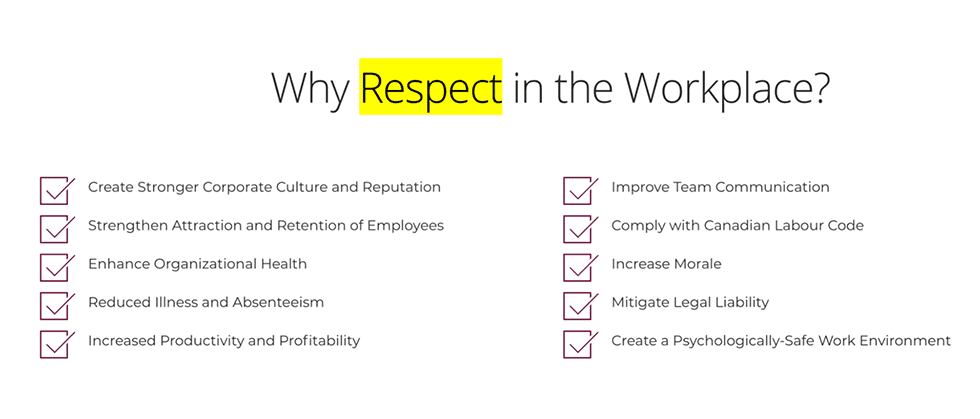
Satisfy the Need for Learning & Growing
Hear what Heather Muir, Mandel’s Marketing Director, had to say about investing in training employees:
When you invest in training, you give employees the resources they need to feel confident. You also show them you’re concerned with their long-term success. When employees know you’re on their side, they’re much more likely to stick around for the long haul.
If you desire passionate employees, invest in helping them learn and grow.
And research by Gallup supports this.
An overwhelming 87% of employees said learning opportunities are a significant consideration in job satisfaction in the study.
When you invest in training, you give employees the resources they need to feel confident about their jobs. Training and growth opportunities show you’re concerned with their long-term success.
And some by-products doing this?
You earn passionate workers and reduce employee retention rates.
Make Employees Feel Like Insiders
Imagine if your boss never invited you to board meetings.
Will you feel nice if you always had to learn about your company’s direction from gossip thrown around by other managers?
If you answered no, and don’t like to feel like an outsider, think about the employees you manage.
They’re no different.
They want to feel like they belong, like they play an integral role in achieving the goals your team is pursuing. And when you satisfy this need, you get them more passionate about work.
Some ways to do this, according to the Eskill Talent Assessment Platform, are:
- Invite employees in for grand tours & meet-and-greets.
- Ask coworkers to help out.
- Dedicate time to check their work progress.
- Encourage socialization among teammates.
- Follow and engage each other online.
- Encourage interdepartmental “mingling”.
How to Measure & Increase Workplace Passion with Pulse Surveys
While researching this guide, I came across an interesting article.
The article was by survey software, Zeffi. It hammered on the need to measure enthusiasm in the workplace continuously.
In it, the author said:
What you can’t measure, you can’t lead! This well-known fact also applies to enthusiasm. If you want to see enthusiasm as one of your goals, you also need to decide how you will measure it.
I was fascinated because enthusiasm and workplace passion have things in common. They’re tangible traits you can’t measure with barometers or by observing employees alone.
And like enthusiasm, if you don’t measure employees’ passion towards work, you can’t lead it, let alone improve it.
So how do you go about this?
Your best bet is to ditch assumptions and ask them how they feel about specific issues in the workplace. Team pulse surveys are great for this.
For instance, little things like how employees feel about the ideas they share with you can affect their passion for work.
But as a manager wearing many hats, you’ll likely neglect this unknowingly. And before you even realize it, this neglect can result in two problems:
- First, employees won’t share new ideas with you.
- As this continues, they lose passion for the work by thinking you don’t value them.
Team pulse surveys help you to avoid all these.
Weekly or bi-weekly, you can automate the mundane task of asking employees how they feel. And your questions will get delivered straight into their inboxes:
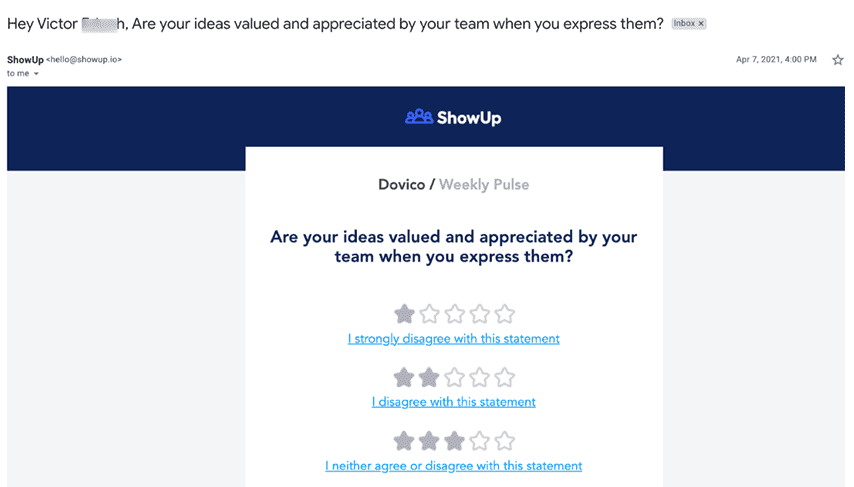
ShowUp anonymizes the survey, so your employees are happy to partake without worrying about their privacy. It also transitions them smoothly to answer other questions in your survey once they click to answer the first one:
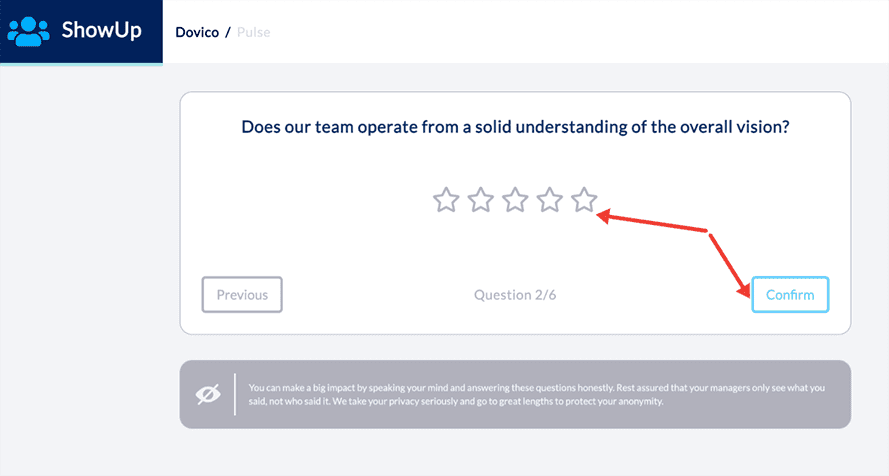
The software then collates their entire responses and crunches the data into a dashboard pinpointing areas you must improve.
What’s more?
ShowUp also gives you the resources to take action to increase team engagement and your employees’ passion for work:

Take ShowUp for a Spin
Get real-time qualitative insights needed to instill passion in your workplace.
Get real-time qualitative insights needed to instill passion in your workplace.
Start your free trial today].
